
Doctor Virtualis-Rivista di Storia della Filosofia Medievale
Scope & Guideline
Advancing Knowledge in Historical Philosophy
Introduction
Aims and Scopes
- Metaphysical Inquiry:
The journal consistently engages with metaphysical concepts, such as the nature of being, causality, and the relationship between the divine and the material world, as seen in discussions on Suárez's theory of real relation and the alchemical order of the world. - Ethics and Moral Philosophy:
A significant focus is placed on the ethical dimensions of medieval philosophy, exploring moral transformation, virtues, and the relationship between natural and divine laws, particularly through the works of thinkers like Augustine and Albert the Great. - Historical Contextualization:
The journal emphasizes the historical context of philosophical ideas, examining how medieval thought evolved in relation to political, social, and religious changes, as illustrated by analyses of controversies and doctrines during the Carolingian era. - Analogy and Its Applications:
A unique contribution of the journal is its exploration of analogy as a philosophical device, particularly in the works of Thomas Aquinas and other medieval scholars, highlighting its role in theology and metaphysics. - Interdisciplinary Approaches:
The journal promotes interdisciplinary research that connects philosophy with literature, history, and other fields, reflecting the multifaceted nature of medieval scholarship.
Trending and Emerging
- Exploration of Order and Disorder:
A growing trend in the journal is the exploration of concepts of order and disorder in medieval thought, as seen in the recent analyses of Gregory the Great and Augustine, highlighting their significance in understanding moral and metaphysical frameworks. - The Role of Analogy in Philosophical Discourse:
The increasing frequency of papers on analogy signifies a renewed interest in its implications for understanding divine and human relations, particularly through the works of influential figures like Aquinas and Eriugena. - Interdisciplinary Connections:
There is a marked trend towards interdisciplinary research that connects philosophy with theology, literature, and history, reflecting a broader understanding of medieval scholarship's complexities and its interwoven nature. - Focus on Eucharistic Doctrine and Theological Controversies:
Recent publications show a heightened interest in theological debates and the development of doctrines, particularly concerning the Eucharist, reflecting a critical engagement with historical controversies that shaped medieval thought.
Declining or Waning
- Contemporary Relevance of Medieval Thought:
There appears to be a waning focus on the direct relevance of medieval philosophy to contemporary issues, as seen in previous discussions that linked medieval ideas to modern philosophical debates. - Specific Regional Studies:
The journal has less frequently published works dedicated to specific regional or cultural studies within the medieval context, suggesting a potential shift towards more generalized themes or broader philosophical inquiries. - Narrative Approaches in Medieval Studies:
There has been a noticeable decrease in papers that explore narrative techniques and their relationship to medieval philosophy, which were more common in earlier volumes.
Similar Journals

GIORNALE CRITICO DELLA FILOSOFIA ITALIANA
Advancing Dialogue in Italian PhilosophyGIORNALE CRITICO DELLA FILOSOFIA ITALIANA is a prestigious journal founded in 1966, published by CASA EDITRICE G C SANSONI SPA in the cultural heart of Florence, Italy. With an emphasis on exploring the rich tradition of Italian philosophy, it provides a critical platform for scholarly articles, discussions, and insights into philosophical discourse. Although it currently holds a Q4 classification in the philosophy category and is ranked 706 out of 806 in the Scopus Arts and Humanities _ Philosophy sector, the journal remains dedicated to fostering academic dialogue and advancing philosophical thought. The journal's unique historical perspective, combined with its commitment to publishing rigorous research, makes it an essential resource for researchers, professionals, and students keen on Italian philosophical heritage. Access to this journal is available through institutional subscriptions, ensuring its valuable content is accessible to those engaged in the philosophical community.

Filosofiya-Philosophy
Engaging Minds, Enriching IdeasWelcome to Filosofiya-Philosophy, an esteemed academic journal dedicated to advancing the field of philosophical inquiry. Published by NATSIONALNO IZDATELSTVO AZ BUKI, this journal aims to foster scholarly exchange and promote critical discussions on various philosophical themes and issues, including but not limited to metaphysics, ethics, logic, and epistemology. With its commitment to rigorous research and thought-provoking analyses, Filosofiya-Philosophy seeks to engage researchers, professionals, and students alike, enriching the discourse surrounding philosophical studies. Although currently not an open-access journal, it provides valuable insights that are crucial for the continuous exploration of philosophical ideas. Based in Sofia, Bulgaria, it plays a vital role in the dissemination of philosophical knowledge, inviting submissions from around the globe to enhance its academic community and further its impact in the realm of philosophy.
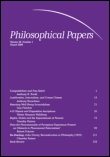
Philosophical Papers
Fostering Intellectual Growth in PhilosophyPhilosophical Papers, an esteemed journal published by Routledge Journals, Taylor & Francis Ltd, stands as a pivotal resource in the field of philosophy. Having established its presence since 1972, this journal has converged a wealth of intellectual discourse and contributes to the continuous development of philosophical thought until 2024. With a prestigious Q1 category ranking in the arts and humanities, and a notable 86th percentile ranking in Scopus's philosophy category, it underscores its commitment to rigorous scholarship and influential research. Although Open Access options are not currently available, the journal remains a vital platform for philosophers, researchers, and students aiming to engage with pivotal philosophical debates and advancements. Set in the UK, Philosophical Papers exemplifies the intersection of tradition and innovation in philosophical inquiry, making it an indispensable reference for anyone dedicated to exploring the complexities of human thought and existence.
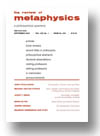
REVIEW OF METAPHYSICS
Advancing philosophical inquiry into the nature of reality.REVIEW OF METAPHYSICS is a distinguished journal published by PHILOSOPHY EDUCATION SOC, INC, dedicated to advancing scholarly discourse in the field of philosophy. With an ISSN of 0034-6632 and an E-ISSN of 2154-1302, this journal has been a crucial platform for philosophical inquiry since its inception in 1975, converging its rich content from 1992 and continuously serving the academic community up to 2022. Based in the United States, specifically at 223 Aquinas Hall, Catholic University America, Washington, DC, it has secured a reputation for quality, reflected in its placement within the Q3 category of the 2023 Philosophy rankings, and a Scopus rank of 367 out of 806 in Arts and Humanities, placing it in the 54th percentile. Although it does not offer open access options, the REVIEW OF METAPHYSICS remains an essential resource for philosophers and students alike, fostering critical perspectives on metaphysical issues, and thereby contributing significantly to the advancement of philosophical studies.

Revista Colombiana de Filosofia de la Ciencia
Cultivating Knowledge in the Philosophy of ScienceRevista Colombiana de Filosofia de la Ciencia, published by UNIV EL BOSQUE, stands as a pivotal platform for the dissemination of knowledge in the field of philosophy of science. With a commitment to open access since 2010, this journal not only enhances the accessibility of crucial scholarly work but also encourages collaboration and dialogue among researchers, professionals, and students alike. Featuring an ISSN of 0124-4620 and an E-ISSN of 2463-1159, the journal fosters critical discussions on the implications and underpinnings of scientific thought, promoting an enriched understanding of how philosophical frameworks can shape scientific practices. The journal aims to bridge disciplines, inspiring new research pathways while contributing to the philosophical discourse surrounding science in Latin America and beyond. This dedication places the Revista Colombiana de Filosofia de la Ciencia as a leading voice in its field, making it an essential read for anyone looking to deepen their engagement with the philosophy that informs scientific investigation and theory.
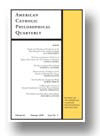
AMERICAN CATHOLIC PHILOSOPHICAL QUARTERLY
Illuminating the Depths of Catholic Philosophical ThoughtAmerican Catholic Philosophical Quarterly, published by the American Catholic Philosophical Association, is a prestigious journal that has been disseminating scholarly work in the fields of philosophy and religious studies since 1996. With its headquarters in Bronx, NY, this quarterly explores diverse philosophical inquiries framed through a Catholic lens, making it a vital resource for researchers, professionals, and students seeking to deepen their understanding of philosophical discourse intertwined with religious thought. Although the journal does not currently offer open access options, its rigorous peer-reviewed content ensures a high academic standard, reflected in its Scopus rankings—#257 in Religious Studies and #393 in Philosophy, placing it in the 60th and 51st percentiles respectively in the 2023 categorization. Aimed at advancing philosophical dialogue and fostering interdisciplinary connections, the *American Catholic Philosophical Quarterly* stands as a significant platform for those committed to exploring the complexities of faith, reason, and morality in contemporary society.

Studia Philosophica Kantiana
Illuminating the Impacts of Kant's Ideas Across CulturesStudia Philosophica Kantiana is a premier academic journal dedicated to the exploration and analysis of Kantian philosophy, published by PRESOVSKA UNIV PRESOVE. With an ISSN of 1338-7758, the journal aims to serve as a vital resource for researchers, educators, and students interested in the nuances of Kant's philosophical contributions and their implications in contemporary thought. Although it currently does not offer an open access option, the journal seeks to publish high-quality articles that advance the understanding of Kantian principles, ethics, and epistemology. The journal includes a diverse array of content such as peer-reviewed articles, critical essays, and reviews, enriching the scholarly discourse in the field of philosophy. As it continues to grow in reputation among its peers, Studia Philosophica Kantiana is poised to make significant impacts on the study and interpretation of Kant's work in Eastern and Western philosophical contexts.
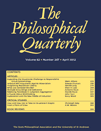
PHILOSOPHICAL QUARTERLY
Exploring the Depths of Inquiry and InsightPHILOSOPHICAL QUARTERLY, a leading journal in the field of philosophy, is published by Oxford University Press, recognized for its commitment to advancing scholarly discourse since its inception in 1950. With an ISSN of 0031-8094 and an E-ISSN of 1467-9213, this prestigious journal is situated in the United Kingdom, reflecting a rich tradition of philosophical inquiry. The 2023 Category Quartiles rank it in the Q1 tier, demonstrating its substantial impact within the philosophy domain, supported by a Scopus rank of 130/806, placing it in the 83rd percentile of arts and humanities. While it does not currently offer open access, the journal remains a vital resource for researchers, professionals, and students seeking to engage with contemporary philosophical issues and theories. As it continues to publish insightful articles and critical discussions, the PHILOSOPHICAL QUARTERLY stands as a testament to the ongoing evolution and relevance of philosophical scholarship.
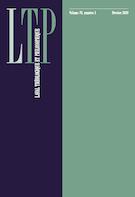
LAVAL THEOLOGIQUE ET PHILOSOPHIQUE
Empowering Minds through Rigorous Academic ExplorationLAVAL THEOLOGIQUE ET PHILOSOPHIQUE, published by UNIV LAVAL in Canada, is a vital scholarly journal devoted to advancing the fields of philosophy and religious studies. With an ISSN of 0023-9054 and an E-ISSN of 1703-8804, this journal serves as a platform for high-quality research, reflecting the diverse and interdisciplinary nature of theological and philosophical inquiry. Although it is currently categorized as Q4 in both Philosophy and Religious Studies, its dedication to encouraging critical dialogue and innovative scholarship positions it as a significant resource for researchers, professionals, and students alike. From its inception in 2002 to its ongoing contributions, the journal has made a noteworthy impact, fostering intellectual engagement and providing a scholarly space for examining complex philosophical and theological questions. With access options predominantly through institutional subscriptions, it invites a robust academic audience to explore its thought-provoking articles and contribute to the rich tapestry of knowledge within these fields. Set against the picturesque backdrop of Quebec City, this journal embodies the vibrant academic spirit of its locale, aiming to connect scholars from around the globe.
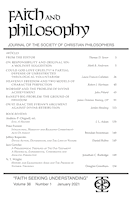
Faith and Philosophy
Illuminating the Dialogue Between Tradition and ModernityFaith and Philosophy, an esteemed journal specializing in the interdisciplinary realms of philosophy and religious studies, is published by the Philosophy Documentation Center. With an impressive ranking of Q2 in Philosophy and Q1 in Religious Studies for 2023, as well as a notable placement in the 85th percentile in Scopus' Religious Studies category, this journal serves as a vital forum for scholars and practitioners alike. Covering a diverse range of topics from metaphysical inquiries to ethical discussions, Faith and Philosophy aims to foster dialogue and deepen understanding within the context of faith and reason. Although it does not currently offer open access options, the journal continues to attract a wide readership with its rigorous academic standards and commitment to advancing philosophical discourse. Addressing complex questions that bridge tradition and contemporary thought, Faith and Philosophy is essential for anyone interested in the intersections of faith, reason, and critical inquiry.